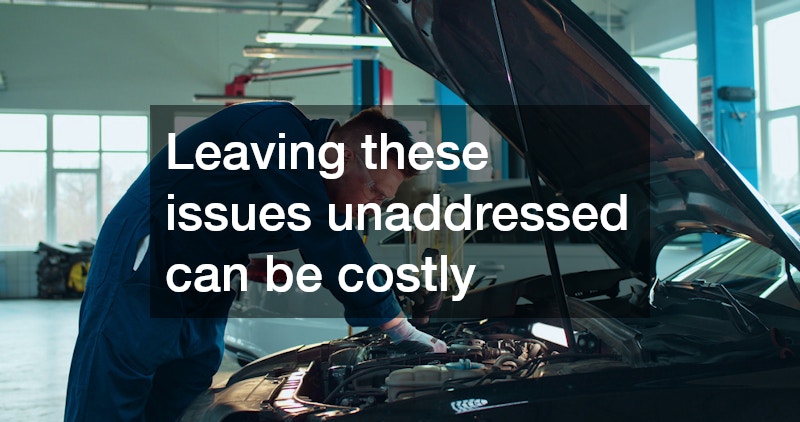When it comes to keeping your vehicle safe and reliable, addressing damage after an accident is essential. Even seemingly minor incidents can lead to hidden issues that compromise performance, safety, and value. Many drivers make the mistake of overlooking early warning signs, only to face bigger problems and more expensive repairs down the road. Understanding when your car requires attention can save time, money, and stress. Here are four clear indicators that it may be time to schedule auto collision repairs.
1. Visible Structural Damage
One of the most obvious signs that your vehicle needs attention is visible damage to its body or frame. Whether it’s a dented bumper, cracked fender, or misaligned door, these issues go beyond aesthetics.
Structural integrity is what protects you and your passengers in the event of another accident, and ignoring body damage can reduce that protection.
Even if the damage seems minor, such as a small dent or scrape, it may signal that deeper structural harm has occurred. For example, a bent frame can affect how your vehicle absorbs impact and may even lead to misalignment of other critical parts. If the hood won’t close properly, or if the doors or trunk no longer shut tightly, those are clear signs of alignment problems that need professional attention.
It’s also worth noting that damage can reduce your car’s resale value. A prospective buyer may hesitate to purchase a vehicle with obvious collision marks, while insurance companies may classify it as “unsafe” if repairs aren’t documented. Seeking professional auto collision repairs promptly ensures that both the visible and hidden damage are addressed, restoring safety and appearance.
2. Steering or Alignment Issues
Another red flag is difficulty controlling or steering your vehicle after an accident. If you notice that your car pulls to one side, requires constant correction to stay straight, or feels unsteady at higher speeds, chances are the alignment has been thrown off. This problem can be linked to a bent axle, damaged suspension, or frame issues—problems that worsen over time if left unchecked.
Not only is poor alignment frustrating, but it also increases tire wear, reduces fuel efficiency, and compromises safety. Misaligned wheels place extra stress on suspension components and make braking less predictable. A misaligned vehicle is also harder to handle in emergencies, such as swerving to avoid a hazard, making it more dangerous to drive.
Pay close attention if your steering wheel appears crooked even when you’re driving straight. That’s a common indicator of post-collision misalignment. Scheduling auto collision repairs can correct these alignment issues, restore smooth handling, and reduce the risk of further mechanical damage.
3. Strange Noises or Vibrations
If your vehicle begins making unusual noises or vibrations following an accident, it’s another sign that repairs are needed. Grinding, clunking, or squealing sounds could indicate that parts have shifted or become loose. Vibrations felt through the steering wheel or floorboards may stem from misaligned wheels, suspension damage, or even frame problems.
These issues don’t just affect your comfort: they can point to deeper mechanical concerns that impact performance and safety. For instance, a loose suspension component might eventually break while driving, leaving you stranded or at risk of an accident. Similarly, vibrations caused by unbalanced tires can worsen fuel economy and shorten the lifespan of your tires.
In some cases, noises may not appear immediately after a collision but develop over time as parts wear down unevenly. This makes it especially important not to dismiss new sounds or sensations in your vehicle. Professional auto collision repairs address not only surface-level damage but also underlying mechanical issues, helping restore your vehicle to optimal condition.
4. Warning Lights and Leaks
Modern vehicles are equipped with advanced sensors that alert you when something is wrong. If your check engine light, airbag light, or another warning signal appears after a collision, it’s important not to ignore it. These lights can indicate electrical issues, damaged sensors, or malfunctions in safety systems like airbags, all of which require immediate attention.
Leaks underneath your vehicle are a serious concern. Fluids such as coolant, oil, or transmission fluid may escape if lines or tanks are damaged during an accident. Driving with low or leaking fluids can quickly lead to overheating, engine failure, or transmission problems. Look for puddles under your vehicle after it’s been parked or check for unusual smells, such as burning oil or leaking coolant, which may indicate hidden problems.
Leaving these issues unaddressed can be costly. An oil leak, for example, may begin as a few drops but could result in complete engine failure if ignored. Prompt auto collision repairs will help identify the source of these issues and prevent them from escalating.
Your vehicle is one of your most valuable assets, and keeping it safe after an accident should be a top priority. Recognizing the warning signs, such as visible body damage, steering issues, strange noises, and warning lights or leaks, can help you determine when auto collision repairs are necessary. Acting quickly not only ensures your safety but also prevents small problems from turning into major expenses.
By consulting a trusted repair professional, you can restore your car’s safety systems, improve its performance, and protect its long-term value. Don’t wait until a minor issue becomes a major setback—schedule an inspection as soon as you notice any of these signs, and drive with confidence knowing your vehicle is in its best condition.




